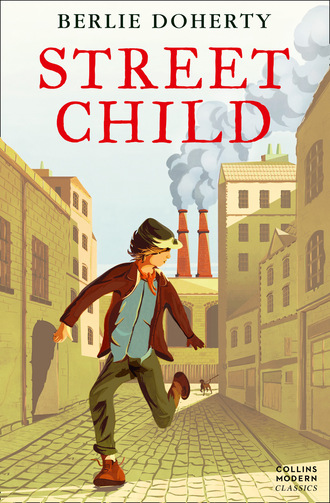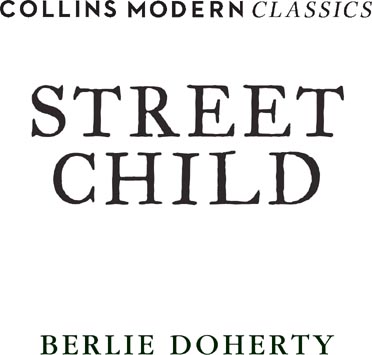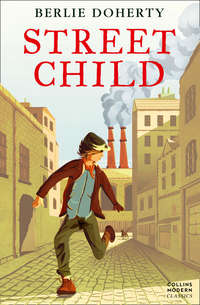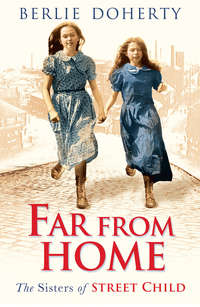
Полная версия
Street Child



Copyright
First published in Great Britain by Hamish Hamilton
First published by HarperCollins Children’s Books 1995
This edition published by HarperCollins Children’s Books 2016
HarperCollins Children’s Books is a division of HarperCollinsPublishers Ltd,
HarperCollins Publishers
1 London Bridge Street
London SE1 9GF
The HarperCollins Children’s Books website address is
www.harpercollins.co.uk
Berlie Doherty’s website address is
www.berliedoherty.com
Text copyright © Berlie Doherty 1993
Why You’ll Love This Book copyright © Julia Golding 2009
Cover design © HarperCollinsPublishers 2016
Cover illustration © Giodarno Poloni 2016
Berlie Doherty asserts the moral right to be identified as the author of this work
All rights reserved under International and Pan-American Copyright Conventions. By payment of the required fees, you have been granted the non-exclusive, non-transferable right to access and read the text of this e-book on screen. No part of this text may be reproduced, transmitted, down-loaded, decompiled, reverse engineered, or stored in or introduced into any information storage and retrieval system, in any form or by any means, whether electronic or mechanical, now known or hereinafter invented, without the express written permission of HarperCollins.
Source ISBN: 9780007311255
Ebook Edition © 2016 ISBN: 9780007397631
Version: 2020-04-14
Note to Readers
This ebook includes the following accessibility features which, if supported by your device, can be accessed via your ereader/accessibility settings:
Change of font size and line height
Change of background and font colours
Change of font
Change justification
Text to speech
For Hilda Cotterill
With thanks to the children of Lynne Healy’s class at Dobcroft Junior School in Sheffield, who helped me with their advice and enthusiasm, and to Priscilla Hodgson, Deborah Walters, Mike Higginbottom, the Barnardo Library, Dickens House, The Ellesmere Port Boat Museum and Sheffield Libraries, who all helped me with their knowledge.
CONTENTS
Cover
Title Page
Copyright
Note to Readers
Dedication
Why You’ll Love This Book by Julia Golding
Tell me Your Story, Jim
Chapter One – The Shilling Pie
Chapter Two – The Stick Man
Chapter Three – Rosie and Judd
Chapter Four – The Workhouse
Chapter Five – Behind Bars
Chapter Six – Tip
Chapter Seven – The Wild Thing
Chapter Eight – The Carpet-Beaters
Chapter Nine – The Jaw of the Iron Dog
Chapter Ten – Lame Betsy
Chapter Eleven – The Spitting Crow
Chapter Twelve – Shrimps
Chapter Thirteen – The Lily
Chapter Fourteen – The Waterman’s Arms
Chapter Fifteen – Josh
Chapter Sixteen – Boy in Pain
Chapter Seventeen – The Monster Weeps
Chapter Eighteen – You Can Do It, Bruvver
Chapter Nineteen – Away
Chapter Twenty – The Green Caravan
Chapter Twenty-One – Circus Boy
Chapter Twenty-Two – On the Run Again
Chapter Twenty-Three– Shrimps Again
Chapter Twenty-Four – Looking for a Doctor
Chapter Twenty-Five – The Ragged School
Chapter Twenty-Six – Goodbye, Bruvver
Chapter Twenty-Seven – Barnie
The End of the Story
More Than a Story
About the Author
By the same author
About the Publisher
Why You’ll Love This Book By Julia Golding
It could’ve been you – that might be the slogan on the movie poster if this story of an ordinary boy up against impossible odds was put on to the big screen. Street Child does something quite extraordinary. It dissolves the gap between just reading about the poverty in Victorian London and makes you live it. This is no dry history lesson, but an adventure into the dark underbelly of those times. Within these pages, you will find monsters and heroes, comedy and tragedy, all set against the backdrop of the scary docklands of London. As I read Berlie Doherty’s brilliant and moving book, I was constantly challenged. How would I have fared if I had been left an orphan with no money or friends to help me? Where would I have gone for love and help? What would you have done?
This is the crushing fate that the main character, Jim Jarvis, faces when his mother dies. He journeys through the horrors of the workhouse, finds brief happiness in a fragile existence helping a street seller and comes to a state close to slavery working on a coal boat where he is treated worse than his master’s dog. The book is full of vivid characters, some of whom could be plucked from a horror novel: Grimy Nick and his dog Snipe, Shrimps, the boy named for the toes showing through the end of his boots, the glittering but treacherous Juglini circus troupe. Acts of kindness – a hug from a woman in the workhouse, Rosie’s care for Jim, Josh on the Newcastle collier ship, the boys tending to a dying friend – these are rare moments that shine out from the darkness like diamonds in a shovel of coal.
But what really works is that you can’t help but fall in behind Jim, rooting for him to find a way out of the traps continually sprung on him. He’s not sweet – don’t expect an angelic Oliver Twist waiting for rescue. He’s a child of the streets with all the savvy that goes with that hard life. But you’ll feel for his overwhelming loneliness and when finally – thankfully – someone listens to his story, you’ll want to cheer.
Jim’s story makes you want to go out and change things so others don’t have to go through the same experience, therefore it comes as a shock to realise that he did exist. Maybe not this exact version of Jim, as Berlie Doherty admits, but it is true that Dr Barnado listened to a street child who sketched out a similar tale and then went on to set up the Barnado’s homes that offered such children a refuge.
Over a hundred years later, the homes still exist. But so does Jim. Maybe close to where you live in the stairwell of a housing estate, or further off in a slum in a developing country, there are millions of Jims and his sisters living today. I felt it was important to listen to Jim’s tale, but it did also make me wonder how many untold stories there are out there and what we can do about it. What do you think?
Julia Golding
Julia Golding is the author of over 13 novels for young people, including The Diamond of Drury Lane, a historical novel about a feisty orphan called Cat Royal, living in an Eighteenth century London theatre, which won the Waterstone’s Children’s Book Prize and the Nestlé Smarties Gold Medal in 2006. Before becoming a writer, she worked as a diplomat in Poland and later became a policy adviser for Oxfam, somehow fitting in a doctorate at Oxford and three children along the way.
TELL ME YOUR STORY, JIM
Jim Jarvis. Want to know who that is? It’s me! That’s my name. Only thing I’ve got, is my name. And I’ve give it away to this man. Barnie, his name is, or something like that. He told me once, only I forgot it, see, and I don’t like to ask him again. “Mister”, I call him, to his face, that is. But there’s a little space in my head where his name is Barnie.
He keeps asking me things. He wants to know my story, that’s what he tells me. My story, mister? What d’you want to know that for? Ain’t much of a story, mine ain’t. And he looks at me, all quiet.
“It is, Jim,” he says. “It’s a very special story. It changed my life, child, meeting you.”
Funny that, ain’t it? Because he changed my life, Barnie did.
I can’t believe my luck, and that’s a fact. Here I am with food in my belly, and good hot food at that, and plenty more where that came from, he says. I’m wearing clothes that smell nice and that don’t have no holes in, neither. And I’m in this room where there’s a great big fire burning, and plenty more logs to put on it so it won’t just die off. There’s just me and him. The other boys are upstairs in their hammocks, all cosy in the big room we sleep in. And downstairs there’s just me and him, special.
I want to laugh. I’m so full of something that I want to laugh out loud, and I stuff my fist in my mouth to stop myself.
Barnie gives me that look, all quiet. “Just tell me your story.”
My story! Well. I creep back to the fire for this. I hug my knees. I close my eyes, to shut out the way the flames dance about and the way his shadow and mine climb up and down the walls. I shut out the sound of the fire sniffing like a dog at a rat-hole. And I think I can hear someone talking, very softly. It’s a woman’s voice, talking to a child. I think she’s talking to me.
“Mister,” I says, just whispering so’s I don’t chase the voice away. “Can I tell you about my ma?”
Chapter One
THE SHILLING PIE
Jim Jarvis hopped about on the edge of the road, his feet blue with cold. Passing carriages flung muddy snow up into his face and his eyes, and the swaying horses slithered and skidded as they were whipped on by their drivers. At last Jim saw his chance and made a dash for it through the traffic. The little shops in the dark street all glowed yellow with their hanging lamps, and Jim dodged from one light to the next until he came to the shop he was looking for. It was the meat pudding shop. Hungry boys and skinny dogs hovered round the doorway, watching for scraps. Jim pushed past them, his coin as hot as a piece of coal in his fist. He could hear his stomach gurgling as the rich smell of hot gravy met him.
Mrs Hodder was trying to sweep the soggy floor and sprinkle new straw down when Jim ran in.
“You can run right out again,” she shouted to him. “If I’m not sick of little boys today!”
“But I’ve come to buy a pudding!” Jim told her. He danced up and down, opening and closing his fist so his coin winked at her like an eye.
She prised it out of his hand and bit it. “Where did you find this, little shrimp?” she asked him. “And stop your dancing! You’re making me rock like a ship at sea!”
Jim hopped on to a dry patch of straw. “Ma’s purse. And she said there won’t be no more, because that’s the last shilling we got, and I know that’s true because I emptied it for her. So make it a good one, Mrs Hodder. Make it big, and lots of gravy!”
He ran home with the pie clutched to his chest, warming him through its cloth wrapping. Some of the boys outside the shop tried to chase him, but he soon lost them in the dark alleys, his heart thudding in case they caught him and stole the pie.
At last he came to his home, in a house so full of families that he sometimes wondered how the floors and walls didn’t come tumbling down with the weight and the noise of them all. He ran up the stairs and burst into the room his own family lived in. He was panting with triumph and excitement.
“I’ve got the pie! I’ve got the pie!” he sang out.
“Ssssh!” His sister Emily was kneeling on the floor, and she turned round to him sharply. “Ma’s asleep, Jim.”
Lizzie jumped up and ran to him, pulling him over towards the fire so they could spread out the pudding cloth on the hearth. They broke off chunks of pastry and dipped them into the brimming gravy.
“What about Ma?” asked Lizzie.
“She won’t want it,” Emily said. “She never eats.”
Lizzie pulled Jim’s hand back as he was reaching out for another chunk. “But the gravy might do her good,” she suggested. “Just a little taste. Stop shovelling it down so fast, Jim. Let Ma have a bit.”
She turned round to her mother’s pile of bedding and pulled back the ragged cover.
“Ma,” she whispered. “Try a bit. It’s lovely!”
She held a piece of gravy-soaked piecrust to her lips, but her mother shook her head and turned over, huddling her rug round her.
“I’ll have it!” said Jim, but Lizzie put it on the corner of her mother’s bed-rags.
“She might feel like it later,” she said. “The smell might tempt her.”
“I told you,” said Emily. “She don’t want food no more. That’s what she said.”
Jim paused for a moment in his eating, his hand resting over his portion of pie in case his sisters snatched it away from him. “What’s the matter with Ma?” he asked.
“Nothing’s the matter,” said Emily. She chucked a log on the fire, watching how the flames curled themselves round it.
“She’s tired, is all,” Lizzie prompted her. “She just wants to sleep, don’t she?”
“But she’s been asleep all day,” Jim said. “And yesterday. And the day before.”
“Just eat your pie,” said Emily. “You heard what she said. There’s no more shillings in that purse, so don’t expect no more pies after this one.”
“She’ll get better soon,” Lizzie said. “And then she’ll be able to go back to work. There’s lots of jobs for cooks. We’ll soon be out of this place. That’s what she told me, Jim.”
“Will we go back to our cottage?” Jim asked.
Lizzie shook her head. “You know we can’t go there, Jim. We had to move out when Father died.”
“Eat your pie,” said Emily. “She wants us to enjoy it.”
But the pie had grown cold before the children finished it. They pulled their rag-pile close to the hearth and curled up together, Jim between Emily and Lizzie. In all the rooms of the house they could hear people muttering and yawning and scratching. Outside in the street dogs were howling, and carriage wheels trundled on the slushy roads.
Jim lay awake. He could hear how his mother’s breath rattled in her throat, and he knew by the way she tossed and turned that she wasn’t asleep. He could tell by the way his sisters lay taut and still each side of him that they were awake too, listening through the night to its noises, longing for day to come.
Chapter Two
THE STICK MAN
They must have slept in the end. The next thing Jim heard was a stamping of heavy feet on the stairs and the rapping of a cane on the floor outside their room.
“The Stick Man!” whispered Emily.
Before the children could sit up the door was flung open and in strode the owner of the house, stamping snow off his boots. He swung off his cape, scattering snowflakes round the room, and as he shook it into the hearth the white embers spat.
“I did knock,” Mr Spink barked. “But when lie-abeds don’t answer then lie-abeds must be got up.”
Emily and Lizzie scrambled to their feet at once. Jim would have crawled under the covers, but his sisters hauled him up between them. The children stood in a limp row in front of their mother.
Mr Spink pushed the damp, yellowy strings of his hair behind his ears and peered over their heads at her. His breath came in little wheezing gasps.
“Is she dead?”
“No, sir, she ain’t dead,” said Emily, fright catching at her throat.
“Sick, then?”
“No, sir, she ain’t sick, neither,” Emily said.
Jim looked at her in surprise. It seemed to him that his mother was very sick, and had been for days.
“Then if she ain’t dead nor sick what’s she doing down there? Lying under the covers like a grand lady with nothing to do! Hiding is she? Counting all her money?” Mr Spink pushed the children out of the way and lifted up the rag-pile with his cane.
The children’s mother had her eyes closed, though the lids fluttered slightly. In the daylight Jim could see how pale she was. He felt for Lizzie’s hand.
“Leave her, sir. She’s tired out, she’s been working that hard,” Emily said. “She’ll be off out to work again soon.”
Jim could tell by the way her voice shook how afraid she was, and how brave she was to talk back to Mr Spink like that.
“Well, if she’s been working, she can pay her rent, and we’ll all be happy. Up you get, woman!” With the silver tip of his stick he lifted the rags clean away from her.
Lizzie knelt down and helped her mother to sit up.
“Where’s your money, Mrs Jarvis?” Mr Spink thrust his cane under his arm and stood with his hands in his pockets, jingling the loose coins there like little bells, as if they made sweet music to his ears. He saw the purse bag on the floor and peered down at it. He leaned down towards Jim, who backed away from his wheezy breath.
“I’m an old man, and I don’t bend. Pick up that purse for me, sonny.”
Jim bent down and picked it up. He held it out at arm’s length for Mr Spink to take, but the man rolled his eyes at him.
“Is it empty, sonny? Empty?” He said, as if he couldn’t believe it. He saw the pie cloth in the hearth, with the crumbs of pastry that the children had left, and the stain of gravy on it. He started back as if the sight of it amazed him and glared round at them all.
“Did you eat pie last night?”
The girls were silent.
“Did you, sonny?”
“Yes,” Jim whispered.
“Was it a lovely meat pie, all hot and full of gravy?”
“I don’t know.” Jim’s throat was as tight as if he still had a piece of pastry stuck there, refusing to be swallowed. He looked at Emily, who had her lips set in a firm line, and at Lizzie, who was sitting now with her head bent so her hair dangled across her face, hiding it. He looked at his mother, white and quiet.
“I bought it,” he burst out. “It was Ma’s last shilling, but I bought the pie.”
He heard Emily give out a little sigh beside him.
Mr Spink nodded.
“No money.” He nodded again, and for a moment Jim thought he’d done the right thing to tell him that the pie had cost him Ma’s last shilling. Mr Spink put out his sweaty hand and took the purse from Jim. He pushed his fingers into it as though it was a glove puppet, and then he dropped it on the floor and jabbed at it with his stick. He took out his silk handkerchief and flapped it open, wiped his hair and his face with it and then had a good blow.
“Oh dear,” he said. He blew his nose long and hard. Jim stole a glance at Emily, but she wouldn’t look at him. “No money, no rent.” Mr Spink blew his nose again. “No rent, no room, Mrs Jarvis.”
“We’ve nowhere else to go,” said Jim’s mother, so quietly that Mr Spink had to stop blowing his nose and bend towards her to listen.
“Ma,” said Jim. “Couldn’t we go back to the cottage? I liked it better there.”
Mr Spink gave a shout of laughter, and for a moment again Jim thought he’d said the right thing.
“Your cottage! When you came crawling to me twelve months ago you was glad of this place, make no mistake about it. But if you like a cottage better, find yourself a father, and let him pay for one. Can you do that?”
Jim shook his head. He swallowed hard. His throat filled up again.
“We’re quite happy here,” Jim’s mother said. “Give us a little longer, and we’ll pay our rent. The girls can help me.”
Mr Spink flapped his handkerchief again and stuffed it in his pocket.
“I’ve made up my mind, Mrs Jarvis. I’ve a family wants to move in here tonight. There’s eight of them – don’t they deserve a home, now? And what’s more – they can pay me for it!”
He swung his steaming cape back over his shoulders and strode out of the room, and they listened in silence to the sound of his cane, tap-tap-tapping on the floor outside the next room. Jim watched with a cold dread as his sisters moved slowly round the room, gathering up their belongings. They had no furniture, though they had seemed to have plenty when they piled it high on the cart the day they left their cottage. But it had all been sold, piece by piece, and what hadn’t been good enough to sell had been broken up and used as firewood.
“Get your horse, Jim,” Emily said, indicating the wooden horse that Jim’s father had carved for him two Christmases ago. “And Lizzie’s boots. You might as well have them. They’re too small for Lizzie now.”
He picked them up. The boots were too big for him to wear yet, but he folded his arms over them and stuck the wooden horse between them. The children stood by the doorway clutching their bundles, while Mrs Jarvis tied her bonnet and fastened her shawl round herself. She moved slowly and quietly, as if all her thoughts were wrapped up deep inside her and she was afraid of breaking them. At last she was ready. She looked round the bare room. The snow had stopped, and sunlight came watery through the window.
“Ma …” said Emily.
Mrs Jarvis looked down at her daughter. She was pale and strained. “I’m coming,” she said.
“But where can we go?”
“I’ll find us a home,” her mother said. “Don’t worry.”
Chapter Three
ROSIE AND JUDD
Mrs Jarvis used up a lot of her remaining strength that morning. She led the children away from the slums where they had lived for the past year and down street after street until they came to a much quieter part of town, where the houses were big and stately. She leaned against some railings to rest. Emily sat down next to her, anxious for her mother.
“Now you’ve got to be good,” Mrs Jarvis said to them. “I’m going to take you to the house where I used to work, only you must be good. Promise me now?”
“Ma! Course we’ll be good,” Emily said.
Mrs Jarvis nodded. “Yes. You’re always good,” she said. “That’s one thing I did right, anyway.”
In the window behind them a finch sang in a tiny cage. It only had room to hop from the floor of its cage to a little perch, and down again, hop, hop, hop, up and down.
“Listen to that bird,” said Jim.
“They only sing when they’re on their own,” Emily told him. “He’s singing for a friend.”
“Poor little thing,” said Lizzie. “Trapped in a cage.”
“We’d better go on,” their mother said. “I’m going to take you to see the only friend I’ve got in the world. Rosie, she’s called. You’ve heard me talk about Rosie at the big house?”
The children nodded. It was a long time since their mother had worked in his lordship’s kitchen, but she still had stories to tell them about it.
“And if Rosie can’t help us,” she sighed, “nobody can.” Emily helped her up again and they moved slowly on, pausing as the carriages swept past them.
When they reached the big house at last, Mrs Jarvis was exhausted and sat down on the steps to rest again. The children gazed up at the tall building.



